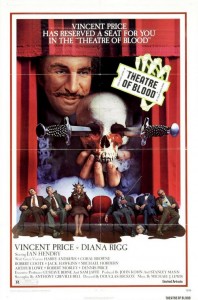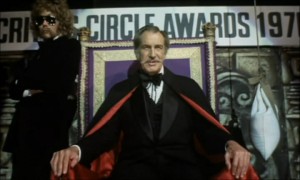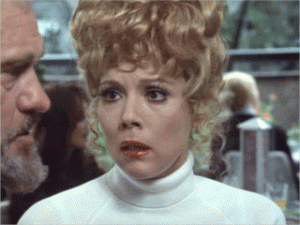
“You’ll find we’ve made several slight alterations in the text and one rather larger—cut.”— Diana Rigg to Harry Andrews
That’s an idea! What about a movie concerning a series of murders recreated in the manner of the deaths from Shakespeare’s plays? Imagine how grisly that could be! And so—can’t you see it now?—this guy, say, a hammy interpreter of the Bard, is killing off, one by one, these people—oh, let’s make them theater critics—these nasty critics who’ve condemned his performances over the years. Revenge is his motive, Shakespeare his theme, malice his method.
Huh? . . . What? . . . It’s been done? Why, yes, now that I think about it, I remember. Vincent Price, that master of the macabre, has already starred in a 1973 British-made film, Theater of Blood, based on this very idea! Imagine.
Having not seen the movie for some years, and then only once, I saw it again recently and became—dare I say it?—“re-enthused.” Although I enjoy most horror films, this variety would usually not be my kind of film, just a little too campy. Oh, also starring Price, there’s The Fall of the House of Usher, which is more to my liking: much more subtle, subdued at times. The Oblong Box is somewhat in between these two films, and I’ve sat through it once or twice. On the other hand, to go way over the top, there’s The Abominable Dr. Phibes and its sequel Dr. Phibes Rises Again, more campy than Theater of Blood and beyond my tolerance for any extended period of time, say, ten minutes after the main title.
But back to where I started, as regards Theater of Blood. Here’s a chance to brush up on your Shakespeare. For example—quiz time!—taking some of the most original examples from the film, in which play is a man, a duke as matter of fact, drowned in a vat of wine? In which might Antonio have to surrender a pound of his flesh closest to his heart if he doesn’t pay back within three months the money he’s borrowed? In which are two sons killed and their mutilated flesh baked in a pie and served to a queen? (Fans of a 1999 Anthony Hopkins caper will know that one.)
Answers later—perhaps.
 In the meantime, the film’s main attraction for me is the colorful array of character actors. As Price remarked, “When I first heard the big names they had assembled for this picture, I just couldn’t believe it. This is my tenth British horror movie in eight years.” Two of the stars, Dennis Price and Jack Hawkins, would unfortunately die the year the film was released. Three of them, Michael Hordern, Robert Morley and Coral Browne, would live into the 1990s. Some of the other supporting actors—all but one victims of the film’s grisly plot—are rounded out with Harry Andrews, Robert Coote, Arthur Lowe and Ian Hendry.
In the meantime, the film’s main attraction for me is the colorful array of character actors. As Price remarked, “When I first heard the big names they had assembled for this picture, I just couldn’t believe it. This is my tenth British horror movie in eight years.” Two of the stars, Dennis Price and Jack Hawkins, would unfortunately die the year the film was released. Three of them, Michael Hordern, Robert Morley and Coral Browne, would live into the 1990s. Some of the other supporting actors—all but one victims of the film’s grisly plot—are rounded out with Harry Andrews, Robert Coote, Arthur Lowe and Ian Hendry.
Know you’re wondering: Who was the first of these characters to die? Why, George Maxwell (Hordern), of course. In the very opening of the movie, he’s off to work, saying good-bye to his wife (Renée Asherson) but making a detour to investigate why some transients are loitering in an abandoned tenement. Well, Maxwell ends up being stabbed multiple times. A policeman, strangely dispassionate about the man staggering and dying before him, quotes Shakespeare: “Oh, pardon me, thy bleeding piece of earth.” Then a more familiar passage: “Friends, Romans, countrymen, lend me your ears.” Both lines from Julius Caesar, are they not?
When Inspector Boot (Milo O’Shea) arrives to investigate, he gives casual regard to a nearby theater poster which advertises, just coincidentally, an old staging of Julius Caesar. Wait a minute! Was not Caesar stabbed many times and on the same day, the Ides of March, as Maxwell? Hum, could all this be more than coincidence?
 It takes several murders before either the police or the members of the Critic’s Circle, a group of theatrical critics, realize there’s a theme behind the horrific killing of the club’s members. Come to find out, a disgruntled Shakespearean actor, Edward Lionheart (Price), thought by everyone to be dead, believes he was unfairly denied a best actor award by these nine individuals and, aided by his daughter Edwina (Diana Rigg), who is often disguised as a mustachioed young man, is murdering them in the manner of the deaths in the Bard’s plays.
It takes several murders before either the police or the members of the Critic’s Circle, a group of theatrical critics, realize there’s a theme behind the horrific killing of the club’s members. Come to find out, a disgruntled Shakespearean actor, Edward Lionheart (Price), thought by everyone to be dead, believes he was unfairly denied a best actor award by these nine individuals and, aided by his daughter Edwina (Diana Rigg), who is often disguised as a mustachioed young man, is murdering them in the manner of the deaths in the Bard’s plays.